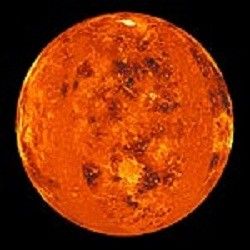Humans Would Sound Like Smurfs on Venus

Have you ever wondered how your voice would sound if you were on Mars or Venus? Now you have a chance to experience it.
Scientists have developed software that literally transforms your voice on earth to a different sound of another world like Mars or Venus.
Scientists from the University of Southampton have invented the unique software to transform the sound of a voice on earth to one that's literally "out of this world".
Scientists created these unique sounds by using some tools and techniques that helped them recreate sounds like lightning on Venus to whirlwinds on Mars and ice volcanoes on Saturn's moon, Titan. In addition to these natural sounds, they have modelled the effects of different atmospheres, pressures and temperatures on the human voice on Mars, Venus and Titan (Saturn's largest moon).
"We are confident of our calculations; we have been rigorous in our use of physics taking into account atmospheres, pressure and fluid dynamics," said Tim Leighton, professor from the University of Southampton, in statement.
According to the scientists, our voice would become much deeper on Venus, because the planet has a dense atmosphere, making our vocal chords vibrate quite slowly. The speed of sound in the atmosphere on Venus is much faster than it is on earth, and this tricks the way our brain interprets the size of a speaker (presumably an evolutionary trait that allowed our ancestors to work out whether an animal call in the night was something that was small enough to eat or so big as to be dangerous). When we hear a voice from Venus, we think the speaker is small, but with a deep bass voice. On Venus, humans sound like bass Smurfs
Despite many years of space exploration, we have no evidence of the sound of other planets. While most planetary probes have focused on imaging with cameras and radar and a couple has carried microphones, none of them successfully listened to the sound of another world, say scientists.
Scientists are going to broadcast these unique sounds at Flight Through the Universe shows from 4-13 April 2012 at the Astrium Planetarium at INTECH near Winchester in the UK.
According to Leighton, this is an amazing opportunity to add another layer of realism to shows. Hearing the sounds communicates ideas about the different atmospheres and highlights the sheer alienness of the other worlds in our solar system, he said. There is interest in this software from other planetariums worldwide, and "we're very proud to be hosting this world first", he said.
Leighton observed that at present, planetariums show great images but there is no real extra-terrestrial sound to accompany them. Some use classical music or make up sound. "This is the real deal - it's as close as we can get to the real sound of another world until a future probe or astronaut actually goes there and listens to what it really sounds like," said Leighton.
© Copyright IBTimes 2025. All rights reserved.





















